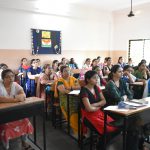Report on Puberty
Puberty is a delicate phase in a child’s life, a child needs to be healthy and they should understand the changes happening in their body during Puberty.
It is the time in life when a boy or girl becomes sexually mature. It is a process that usually happens between ages 10 and 14 for girls and ages 12 and 16 for boys. It causes physical changes, and affects boys and girls
This time brings so many changes that it’s easy for kids to feel insecure and alone. Often, kids going through puberty worry about how they look. It can help them to know that everyone goes through these changes, many of them awkward.
We at AMRITA Vidyalayam Juinagar recognise how frightening it feels, like you don’t understand what is happening to your body – many of us will have heard stories of young people unknowingly starting their periods and fearing they were wounded! We want to make sure that young people have all the information that is helpful and relevant to them, in order to reduce stigma and shame.
The school counsellor Ms Gayatri Nathani P conducted a session on puberty with the girls of the 5th grade explaining about the importance of menstruation, the hygiene one needs to maintain, the number of times we need to change and also wash our genitals properly, the diet one needs to follow, how do we take care of ourselves if we have a patch on our panties, what to do in school?whom do we report?
The following were also discussed to help the children understand more
· Girls become more rounded, especially in the hips and legs.
· Girls’ breasts begin to swell and then grow, sometimes one faster than the other.
· Girls and boys get pubic hair and underarm hair, and their leg hair becomes thicker and darker.
· Both girls and boys often get acne and start to sweat more.
· Both girls and boys have a growth spurt. · Boys’ voices change and become deeper.
· Boys grow facial hair and their muscles get bigger.
· When a girl begins menstruating, each month her uterine lining fills with blood in preparation for a fertilized egg. If the egg isn’t fertilized, she will have a period. If it is fertilized, she will become pregnant.
· A girl’s period may last 3 days to a week, and she can use sanitary (pads) or tampons to absorb the blood.
We believe that by equipping young people with this information, they will be better placed to look after themselves intentionally and holistically.









